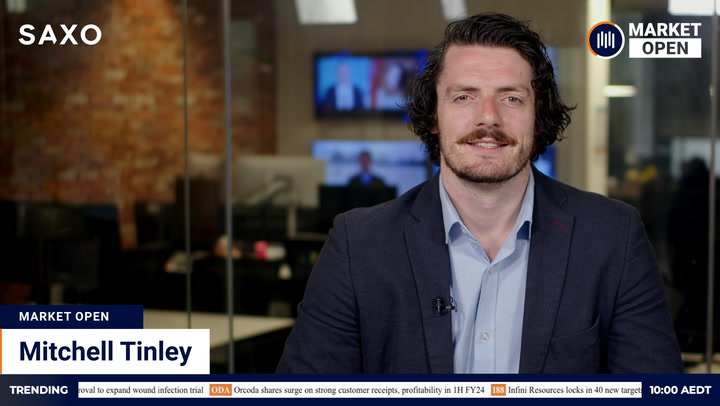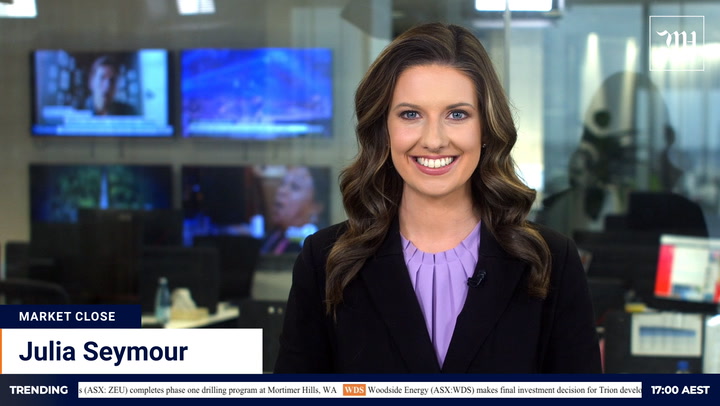Aussie shares pointed lower for a third day after a plunge in oil and a spike in bond yields weighed heavily on Wall Street.
Growth stocks led a sharp retreat in the US. The Nasdaq Composite tumbled 3 per cent. Oil slumped almost 7 per cent.
ASX futures declined 43 points or 0.64 per cent, suggesting a sour end to a week that began with two straight gains and a two-week high.
Wall Street
Market-leading megacap tech stocks led the retreat after bond yields jumped 11 basis points to their highest level in 14 months. The Nasdaq Composite dived 409 points or 3.02 per cent.
The S&P 500 retreated 59 points or 1.48 per cent from Wednesday’s all-time high. The Dow Jones Industrial Average hit a new record before fading to a loss of 153 points or 0.46 per cent.
“Risk of rates rising too fast remains a key concern,” Craig Johnson, technical market strategist at Piper Sandler, told CNBC. “Buying pressure has not been equal over the last several weeks as growth stocks lag behind due to headwinds from higher interest rates.”
Tech and other growth sectors are particularly vulnerable to higher borrowing costs because their valuations depend heavily on future earnings. Apple and Amazon dropped 3.4 per cent, Netflix 3.8 per cent and Tesla 6.9 per cent.
The surge in borrowing costs came less than a day after the US Federal Reserve reassured investors it did not expect to raise official rates until 2023.
“The Fed just saying they are not going to raise rates until 2023 really means nothing,” Tim Ghriskey, chief investment strategist at Inverness Counsel, told Reuters. “The Fed is on the sidelines, but if bond yields keep going up, that is what really hurts the economy.”
The financial sector resisted the downtrend, rising almost 0.6 per cent. Lenders typically benefit from higher rates by increasing their margins.
Optimism over the economic recovery was dented by a setback in weekly claims for unemployment benefits. First-time claims increased to 770,000 last week from 725,000 the previous week. Economists polled by Dow Jones had predicted a decline to around 700,000.
Australian outlook
Tech and other yield-sensitive sectors look to be back in the market’s gun-sights following a sobering night in the US. There is a growing gap between what central banks say about borrowing costs and what those costs actually do. Bond markets are dictating terms, whether the Fed and RBA like it or not.
The US tech sector dived almost 2.9 per cent. Expect our tech stocks to follow suit. The Australian ten-year yield climbed above 1.83 per cent yesterday and seems certain to go higher this session following unexpectedly strong jobs data yesterday. (The rationale is that increasing employment puts pressure on wages, which feeds inflation.)
Perhaps surprisingly, tech was not the night’s worst performer. The energy sector plunged 4.7 per cent after crude took its biggest hit since last June (more below).
The S&P/ASX 200 hit a two-week high on Tuesday but finished yesterday firmly back in the middle of its current trading range. Futures action suggests the index will test the lower levels of the range this session.
January retail sales figures are due at 11.30 am AEDT.
The dollar declined 0.78 per cent to 77.53 US cents.
Commodities
Concerns over tensions between the US and Russia, a European vaccine pause and rising US stockpiles triggered oil‘s worst night since June. Brent crude settled $4.72 or 6.9 per cent in the red at US$63.28 a barrel. The US benchmark fell 7.1 per cent to US$60. Both benchmarks declined for a fifth straight session.
“US-Russia tensions are increasing, with the US threatening sanctions on Russia,” Phillip Streible, chief market strategist at Blue Line Futures, told MarketWatch. “One way Russia could retaliate is to target shale producers by flooding the market with oil.”
Gold gave up most of the progress it made during yesterday’s Australian trading hours, briefly turning negative as yields rallied. Gold for April delivery settled $5.40 or 0.3 per cent ahead at US$1,732.50 an ounce. The NYSE Arca Gold Bugs Index fell 1.9 per cent.
Mining giants BHP and Rio Tinto rallied in the UK, then fell in the US as the market mood deteriorated. BHP’s US-listed stock dropped 2.31 per cent after its UK-listed stock added 1.37 per cent. Rio Tinto shed 1.45 per cent in the US and gained 1.79 per cent in the UK. The spot price for iron ore landed in China was broadly steady yesterday, edging up 15 cents or 0.1 per cent to US$166 a tonne.
Copper declined 0.3 per cent to US$4.11 a pound.







